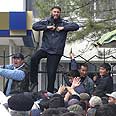
Bishkek last week
Photo: AP
Kyrgyzstan's Jewish community alarmed after riots
'It's the first time in the history of our community here that we see such clear signs of anti-Semitism,' chief rabbi says outside attacked Bishkek synagogue. Director of the National Conference of Soviet Jewry: Local Jews will be very concerned until there is a formal government
Arieh Reichman, Kyrgyzstan's chief rabbi, shook his head as he presented a vodka bottle filled with flammable liquid that was thrown at the Muslim country's sole synagogue during violent riots last week.
He said it was the first act of violence against the country's tiny Jewish community, apparently triggered by the chaos and violence that ousted Kyrgyz President Kurmanbek Bakiyev on April 7.
"It's the first time in the history of our community here that we see such clear signs of anti-Semitism," he told Reuters outside the synagogue, a simple one-story building in Bishkek.
Worrying Study
Aviel Magnezi
On eve of Holocaust Day, Institute for Study of Contemporary Anti-Semitism and Racism report shows that in wake of Operation Cast Lead, 2009 was worst since monitoring of anti-Semitic acts began 20 years ago. Number of violent incidents totaled 1,129 last year compared to 559 in 2008
"Kyrgyzstan has always been hospitable. During Soviet times and under its later leaders, it has always been tolerant. So what is happening right now is very alarming."
Reichman said attackers tried to set the synagogue on fire and pelted it with Molotov cocktails. Holding up one that did not explode, he could not say who he thought the attackers were.
There have been few cases of anti-Semitism in Kyrgyzstan's post-Soviet history and the country's 1,500-strong Jewish community has coexisted peacefully in the capital Bishkek with its predominantly Muslim population.
Bishkek residents have themselves been puzzled and linked the sudden acts of anti-Semitism to some people's aversion to the business partners of Bakiyev's son, Maxim. At least one of them is Jewish.
Anti-Semitic posters have sprung up around the capital, they said. One poster that appeared outside the presidential White House after the night of fighting stated: "Dirty Jews and all those like Maxim Bakiyev have no place in Kyrgyzstan."
Reichman said the community had appealed for protection to the self-proclaimed government led by Roza Otunbayeva. But not all Bishkek residents agreed violence was an issue.
"This is wrong," said Yerlan, a Kyrgyz man who lives near the synagogue. "We have never seen ... any attacks on the synagogue or any negative feelings toward the Jewish community."
Mark Levin, executive director of the National Conference of Soviet Jewry (NCSJ) in Washington, said he was concerned.
"There have been isolated incidents of violence against Jews in Bishkek, and while there does not appear to be an organized effort to undermine the Jewish community there, the locals will be very concerned until there is a formal government," he told Reuters by telephone.















